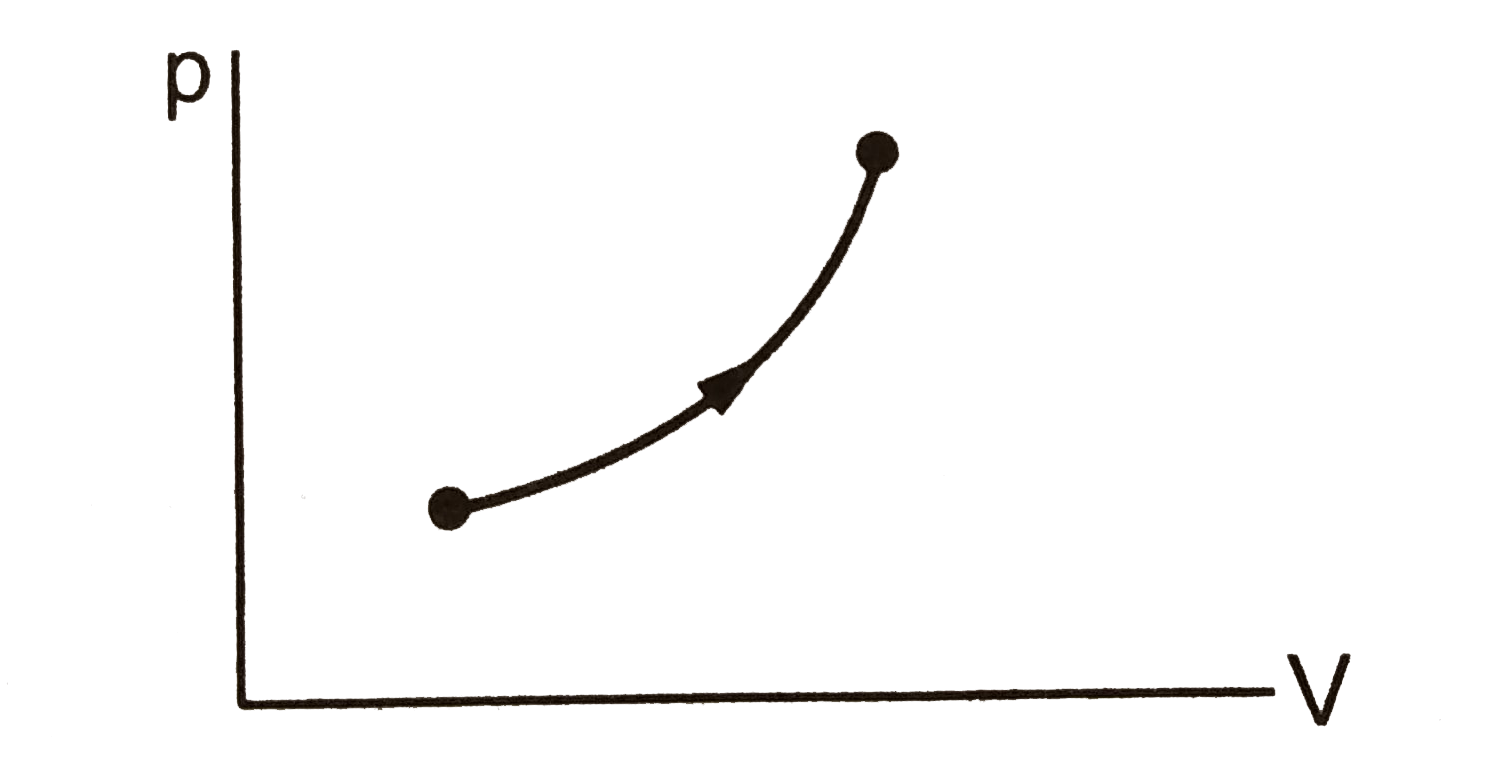If R= universal gas constant, the amount of heat needed to raise the temperature the temperature of 2mol of an ideal monatomic gas from 273K to 373K when no work is done is
a. 100R
b. 150R
c. 300R
d. 500R
The correct Answer is:C
To solve the problem of calculating the amount of heat needed to raise the temperature of 2 moles of an ideal monatomic gas from 273 K to 373 K when no work is done, we can follow these steps:
Step 1: Understand the relationship between heat and internal energy
In thermodynamics, the heat added to a system (ΔQ) is related to the change in internal energy (ΔU) and the work done (W) on the system by the equation:
ΔQ=ΔU+W
Since the problem states that no work is done (W = 0), we can simplify this to:
ΔQ=ΔU
Step 2: Determine the change in internal energy (ΔU)
The change in internal energy for an ideal gas can be calculated using the formula:
ΔU=nCvΔT
where:
- n = number of moles of gas
- Cv = molar heat capacity at constant volume
- ΔT = change in temperature
Step 3: Identify the values for the variables
From the problem:
- n=2 moles (given)
- For a monatomic ideal gas, Cv=3R2
- The initial temperature T1=273K and the final temperature T2=373K
Now, calculate the change in temperature:
ΔT=T2−T1=373K−273K=100K
Step 4: Substitute the values into the ΔU equation
Now we can substitute the values into the equation for ΔU:
ΔU=nCvΔT
ΔU=2(3R2)(100)
Step 5: Simplify the equation
Calculating further:
ΔU=2⋅3R2⋅100
The 2s cancel out:
ΔU=3R⋅100=300R
Step 6: Conclude the result
Since ΔQ=ΔU, we have:
ΔQ=300R
Thus, the amount of heat needed to raise the temperature of the gas is:
ΔQ=300R
Final Answer:
The amount of heat needed is 300R.
---
In thermodynamics, the heat added to a system (ΔQ) is related to the change in internal energy (ΔU) and the work done (W) on the system by the equation:
ΔQ=ΔU+W
Since the problem states that no work is done (W = 0), we can simplify this to:
ΔQ=ΔU
The change in internal energy for an ideal gas can be calculated using the formula:
ΔU=nCvΔT
where:
- n = number of moles of gas
- Cv = molar heat capacity at constant volume
- ΔT = change in temperature
From the problem:
- n=2 moles (given)
- For a monatomic ideal gas, Cv=3R2
- The initial temperature T1=273K and the final temperature T2=373K
ΔT=T2−T1=373K−273K=100K
Now we can substitute the values into the equation for ΔU:
ΔU=nCvΔT
ΔU=2(3R2)(100)
Calculating further:
ΔU=2⋅3R2⋅100
The 2s cancel out:
ΔU=3R⋅100=300R
Since ΔQ=ΔU, we have:
ΔQ=300R
ΔQ=300R
The amount of heat needed is 300R.
Topper's Solved these Questions
- BOOK - NCERT FINGERTPS ENGLISHCHAPTER - THERMODYNAMICSEXERCISE - HOTs8videos
THERMODYNAMICS
- BOOK - NCERT FINGERTPS ENGLISHCHAPTER - THERMODYNAMICSEXERCISE - Assertion & Reason15videos
THERMODYNAMICS
- BOOK - NCERT FINGERTPS ENGLISHCHAPTER - THERMAL PROPERTIES OF MATTEREXERCISE - Assertion And Reason10videos
THERMAL PROPERTIES OF MATTER
- BOOK - NCERT FINGERTPS ENGLISHCHAPTER - UNITS AND MEASUREMENTSEXERCISE - Assertion And Reason15videos
UNITS AND MEASUREMENTS
Similar Questions
Amount of heat energy required to raise the temperature of 2 g neon gas by 54°F at constant volume is (R= 2 cal mol−1K−1)
View SolutionForty calories of heat is needed to raise the temperature of 1 mol of an ideal monatomic gas from 20∘C to 30∘C at a constant pressure. The amount of heat required to raise its temperature over the same interval at a constant volume (R=2calmol−1K−1) is
View Solution50 cal of heat is required to raise the temperature of 1 mole of an ideal gas from 20∘C to 25∘C, while the pressure of the gas is kept constant. The amount of heat required to raise the temperature of the same has through same temperature range at constant volume is ( R = 2 cal/mol/K)
View Solution70 calories of heat is required to raise the temperature of 2 moles of an ideal gas at constant pressure from 40∘C to 45∘C (R=2cal/mol−.∘C). The gas may be
View Solution70 calories of heat is required to raise the temperature of 2 mole of an ideal gas at constant pressure from 30^@C to 35^@C . The amount of heat required to raise the temperature of the same gas through the same range at constant volume is
 View Solution
View Solution70 calories of heat is required to raise the temperature of 2 mole of an ideal gas at constant pressure from 30∘C to 35∘C . The amount of heat required to raise the temperature of the same gas through the same range at constant volume is
 View Solution
View SolutionTwo moles of an ideal monatomic gas is heated at constant pressure so that its temperature increases from 127∘C to 227∘C , then work done by gas
View SolutionIf 2 mol of an ideal monatomic gas at temperature T0 are mixed with 4 mol of another ideal monatoic gas at temperature 2T0 then the temperature of the mixture is
View SolutionIf 2 mol of an ideal monatomic gas at temperature T0 are mixed with 4 mol of another ideal monatoic gas at temperature 2T0 then the temperature of the mixture is
View SolutionQ cal of heat is required to raise the temperature of 1 mole of a monatomic gas from 20∘C to 30∘C at constant pressure. The amount of heat required to raise the temperature of 1 mole of diatomic gas form 20∘C to 25∘C
View Solution

